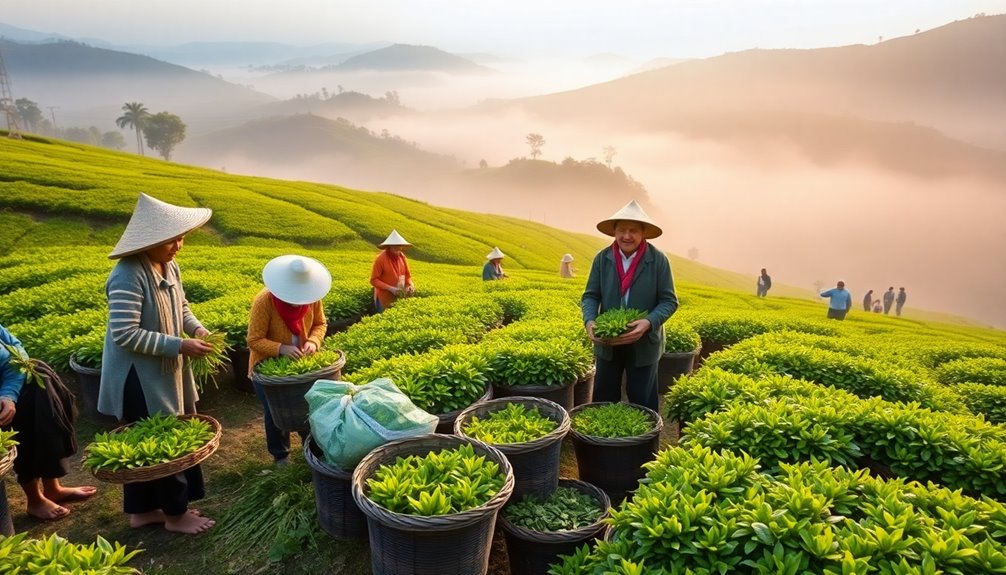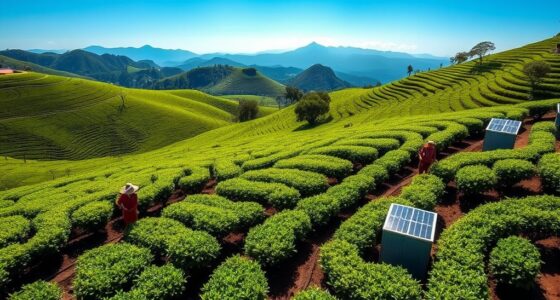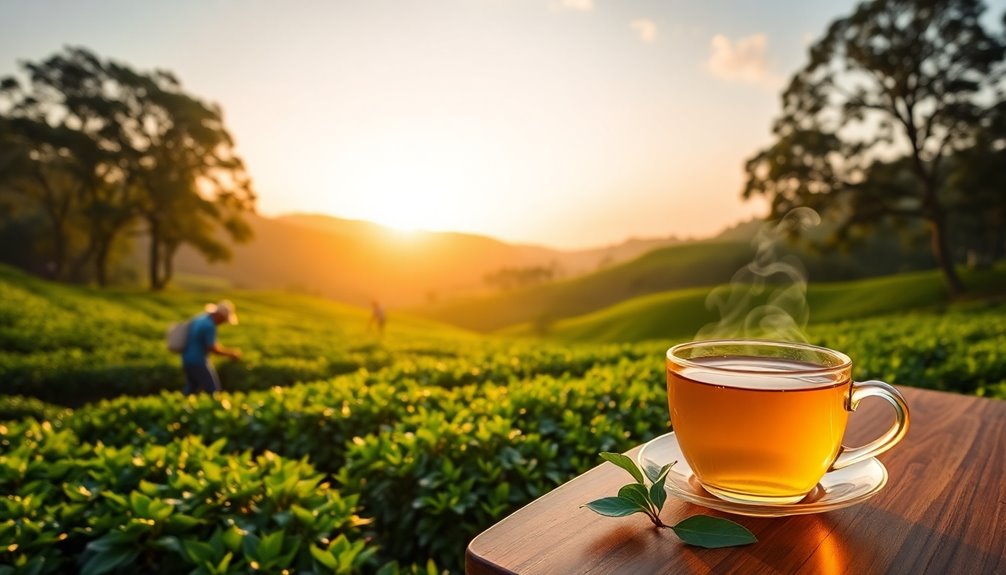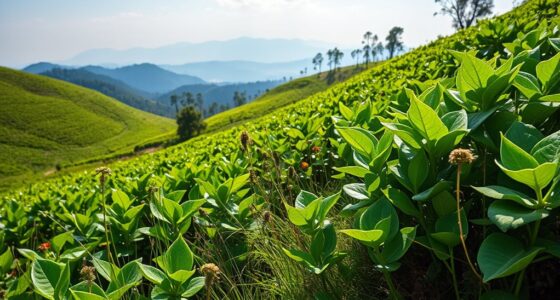When you enjoy your ethically sourced tea, you're celebrating dedicated farmers who work hard to improve their lives and communities. These farmers focus on sustainable practices, ensuring they earn fair prices, which helps lift their families out of poverty. Many women in the tea industry are empowered through training and resources, making a big difference in their communities. Each farmer carries unique cultural traditions that enhance tea cultivation and connect people. It's exciting to know your choices support these hardworking individuals. If you keep exploring, you'll discover even more about their inspiring stories and how your tea makes an impact!
Key Takeaways
- Ethically sourced tea supports small-scale farmers, ensuring they receive fair prices that improve their livelihoods and empower their communities.
- Many women farmers benefit from Fairtrade initiatives, gaining access to resources and training that enhance tea production and promote gender equality.
- Cultural traditions in tea cultivation, such as communal harvesting and tea ceremonies, strengthen community bonds and showcase unique practices.
- Ethical sourcing addresses labor exploitation issues, promoting fair wages and better working conditions for tea plantation workers.
- Consumer awareness of sourcing practices encourages support for ethical brands, fostering a culture of responsible consumption that benefits farmers.
Introduction
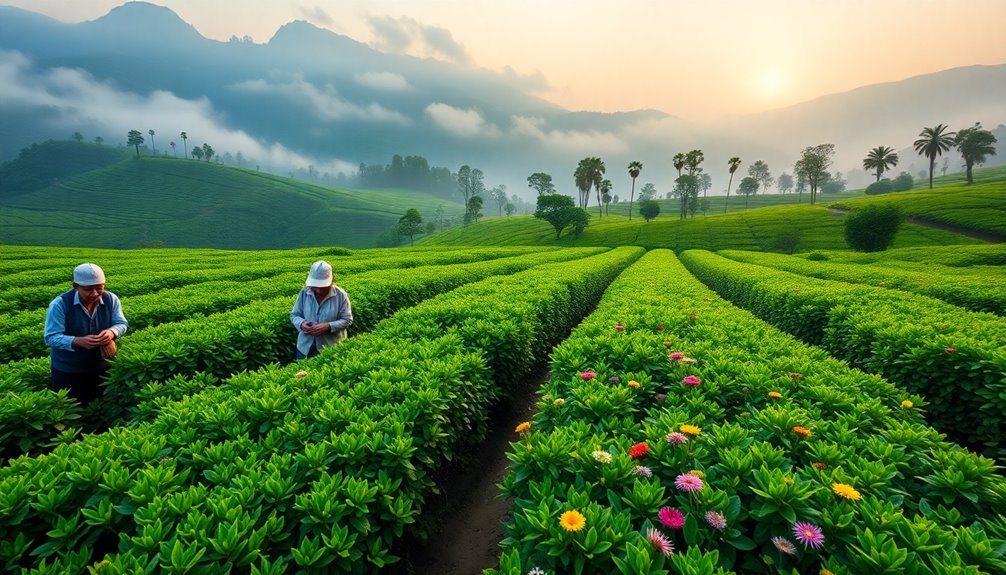
When you sip a cup of ethically sourced tea, you're not just enjoying a flavorful beverage; you're supporting a movement that uplifts small-scale farmers. These tea producers work hard to create delicious teas while caring for the environment. By choosing ethically sourced options, you help ensure they receive fair prices for their hard work.
Imagine the joy of knowing your tea comes from farmers who use sustainable practices and traditional methods. In places like Yunnan, China, these farmers cultivate unique tea varieties, often passed down through generations. Their dedication not only enhances the quality of your tea but also nurtures local biodiversity and tea culture.
When you engage with these farmers, perhaps through visits or conversations, you build a personal connection that deepens your understanding of tea production. You learn about the challenges they face and the love they put into every leaf.
This connection makes your tea-drinking experience even more special. So, the next time you enjoy a cup of tea, remember the farmers behind it. You're part of a bigger story that celebrates their hard work and commitment to a better future!
Fairtrade Impacts Local Communities
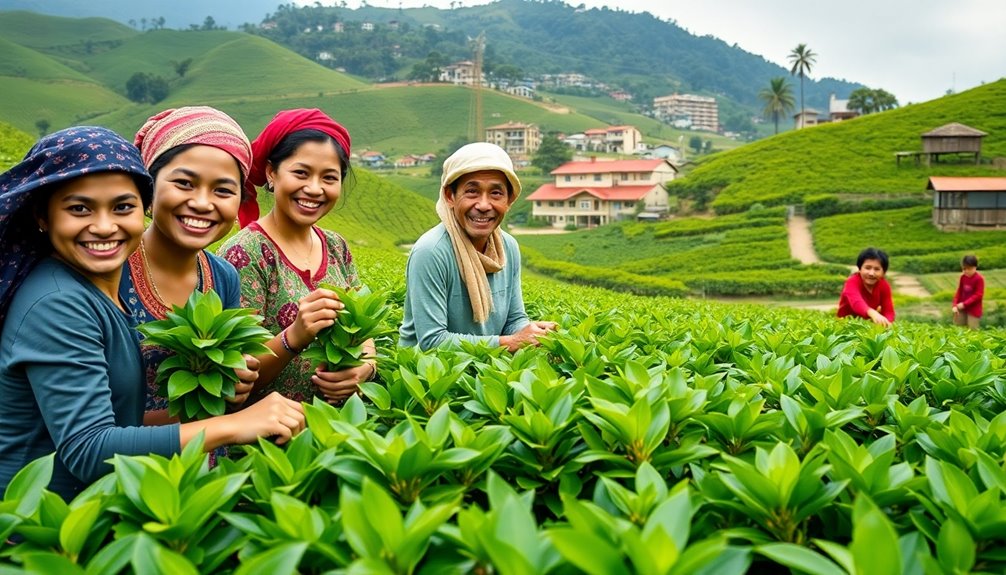
Fairtrade initiatives have transformed local communities by lifting farmers out of poverty and fostering sustainable development. When you choose fair trade tea, you're not just enjoying a delicious drink; you're helping small-scale farmers earn enough to support their families.
These farmers often face tough working conditions, but Fairtrade certification connects them to global markets. This means they receive fair prices for their products, which leads to better livelihoods.
Take Rosine Bekoin, for example. After participating in Fairtrade training, she boosted her tea production by 50%. That's a big difference!
Community empowerment is also a key part of Fairtrade. Women like Edith Kouame are helping fellow farmers strengthen their communities, ensuring that everyone can work together for a brighter future.
Additionally, Fairtrade promotes sustainable practices that protect the environment while improving incomes. When farmers earn enough, they can invest back into their communities, creating a cycle of growth and improvement.
Empowering Women Tea Workers
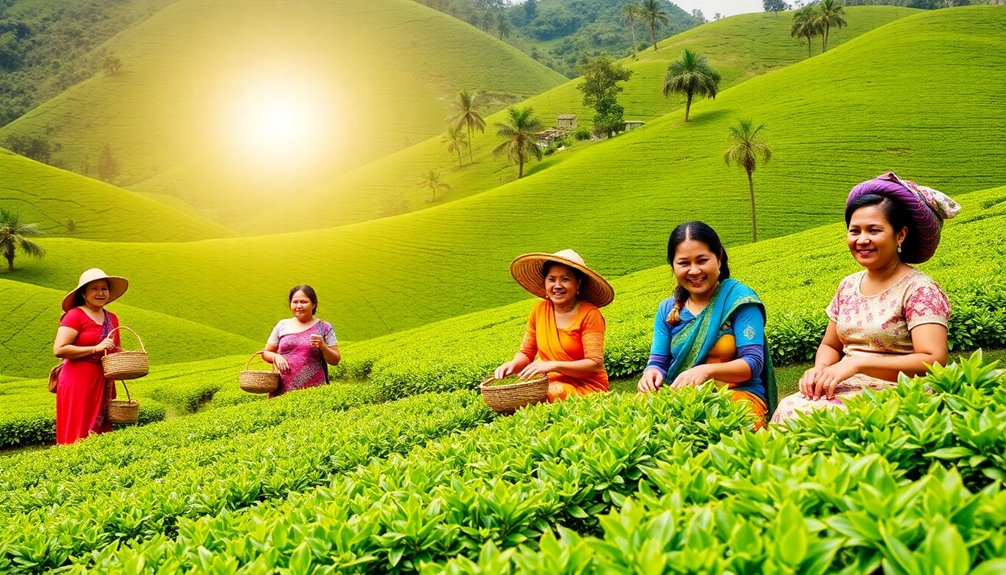
Women tea workers are the backbone of the tea industry, yet they often endure challenging working conditions and face significant barriers to success. Thankfully, empowering women is becoming a priority. Fairtrade tea initiatives are leading the way, providing resources and training that help these amazing women thrive.
Many women, like Rosine Bekoin, are stepping up to advocate for gender equality. They're not just working on the plantations; they're also becoming leaders in their communities. By receiving training, some women have increased their production by up to 50%! This is a huge boost for their families and communities.
Organizations focused on fair trade recognize the importance of supporting women tea workers. They offer programs that teach new skills and promote independence.
Community efforts, led by inspiring women like Edith Kouame, emphasize teamwork and cooperation. These initiatives create strong networks that foster resilience among plantation workers.
With organic certification becoming more popular, women are also learning how to grow tea sustainably. This not only helps the environment but also ensures a brighter future for their families.
Together, these efforts show just how powerful women can be in the tea industry!
Cultural Traditions in Tea Cultivation
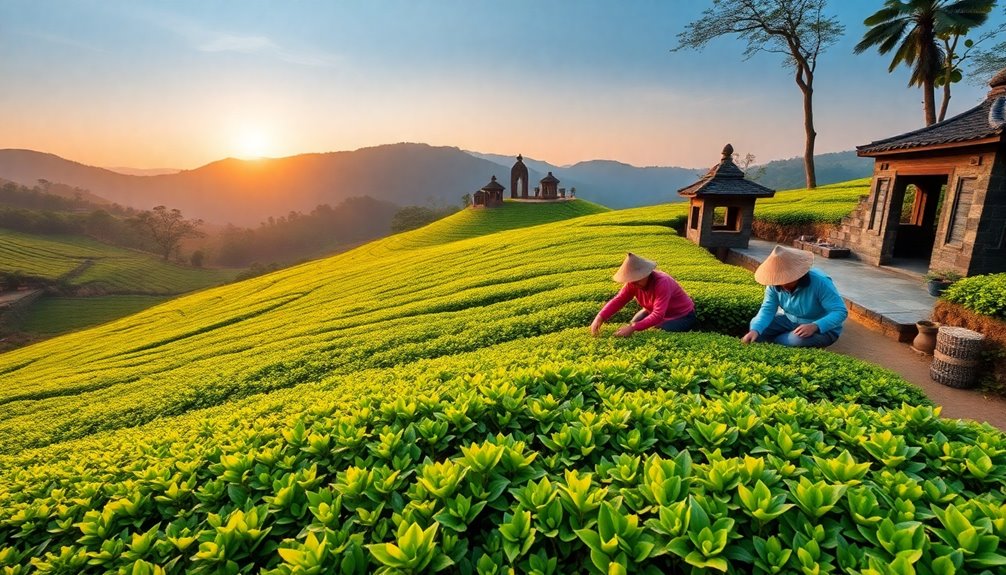
Tea cultivation embodies a rich tapestry of cultural traditions that vary widely across the globe. In places like Japan, you'll find intricate tea ceremonies that celebrate the drink's beauty and harmony, often influenced by Zen Buddhism principles.
Meanwhile, in China, communal tea harvesting rituals bring people together, showcasing the bond between nature and community.
In Yunnan, where pu-erh tea is grown, local ethnic minorities blend their customs with sustainable farming practices, ensuring both the tea leaves and their heritage are preserved.
The art of hand-rolling tea leaves, a skill passed down through generations, shines in Taiwan and Japan, highlighting the craftsmanship behind your favorite brew.
Many tea-growing communities also celebrate seasonal festivals, like the Dragon Boat Festival in China. These joyful events honor the harvest and include special rituals aimed at bringing good fortune and plentiful yields.
Traditional methods of tea cultivation focus on biodiversity, showing a deep respect for the land and the importance of maintaining ecological balance. Additionally, the cultivation of tea often involves herbal tea brewing techniques that enhance the flavor and quality of the final product.
Labor Exploitation in Plantations
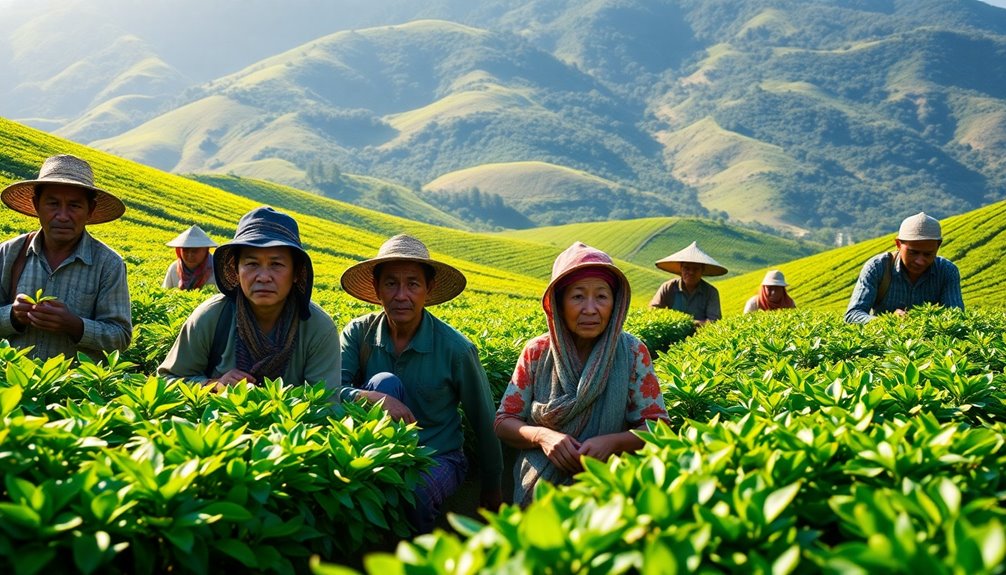
Exploiting labor on tea plantations is a harsh reality that many workers face daily. In places like Assam, permanent workers earn between £1 and £2 each day, which is way below the legal minimum wage of £3. This shows just how widespread labor exploitation is in the tea industry. You might be surprised to learn that many workers live in poverty, even though they work hard every day.
Sadly, gender inequality also plays a big role here. Most tea harvesters are women, and they often work under tough conditions without enough facilities. They deserve better!
Plus, weak workers' representation means that many don't have a voice. Union activities are often influenced by management, leaving workers without support when they really need it.
There are serious human rights abuses reported too, including disturbing claims of rape and misuse of power, especially in East Africa. These issues reflect a troubling history tied to colonial practices.
Practical Applications
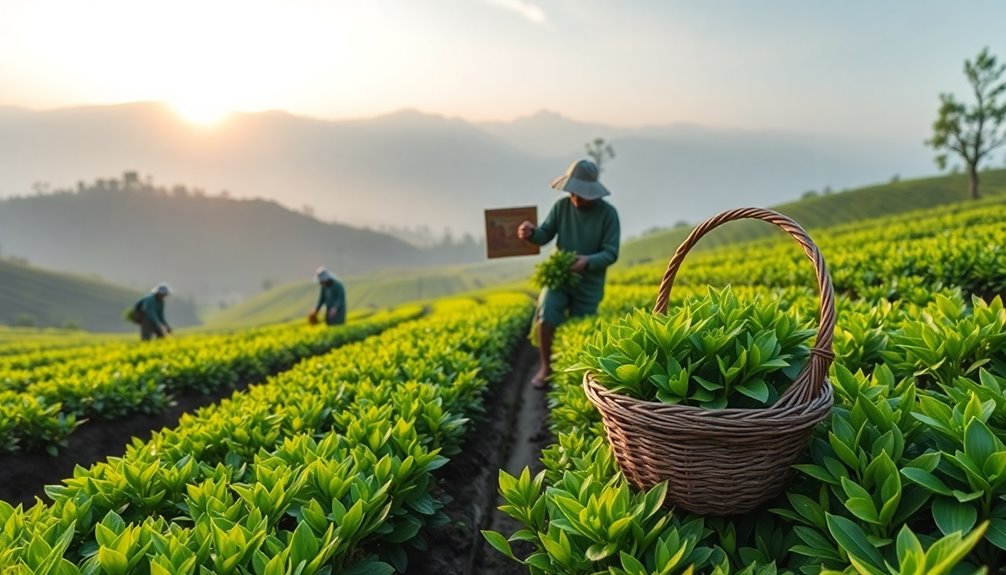
Understanding the harsh realities of labor exploitation in tea plantations highlights the importance of ethical sourcing practices. When you choose to support brands that engage directly with farmers, you're making a difference! Initiatives like Direct Care Trade let you see how these brands source our teas. They build trust and ensure quality, which is exciting!
Many ethical tea brands prioritize relationships with smallholder farmers. This means they pay fair prices, allowing farmers to thrive, even in challenging times. By reducing costs from large companies, more of your money goes directly to the farmers. This helps improve their lives and supports community development. Additionally, fair compensation can significantly reduce the risk of narcissistic abuse in labor relations, fostering a healthier work environment. Moreover, ethical sourcing practices can lead to enhanced investment returns for farmers by providing them with stable incomes. Furthermore, investing in sustainable practices can help ensure that tea farming remains viable for future generations.
Training programs from Fairtrade and others teach farmers about quality control and sustainable practices. This means better loose leaf tea for you! When you sip your cup, you can feel good knowing it supports hardworking farmers. Additionally, ethical sourcing not only benefits farmers but also promotes animal welfare standards in agricultural practices, ensuring a holistic approach to sustainability.
You can make a positive impact by choosing brands that share their supply chains. This fosters transparency and accountability in tea production.
Frequently Asked Questions
Is the Tea Industry Ethical?
The tea industry often struggles with ethical issues, including low wages and labor rights violations. You should be aware that certifications may not guarantee fair treatment, and environmental concerns further complicate the industry's ethical standing.
Is the Republic of Tea an Ethical Company?
Yes, the Republic of Tea's commitment to ethical sourcing, sustainable practices, and fair labor standards confirms its status as an ethical company. You'll find their dedication to transparency and community support truly impressive.
Conclusion
Now that you know the amazing farmers behind your favorite ethically sourced tea, you can sip with joy! Each cup supports local communities, empowers women, and honors cultural traditions. You can feel good knowing that your choice helps fight labor exploitation in plantations. So, next time you enjoy a warm cup, remember the hard work and love that goes into every leaf. Let's celebrate these farmers and their wonderful contributions to our world!

